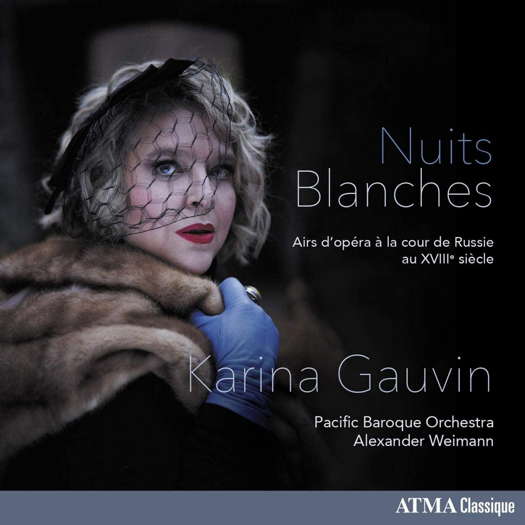- Gál
- Hunka
- Juan Orrego-Salas
- Georg Enescu
- Victor Hochhauser
- Gran Mariscal de Ayacucho Symphony Orchestra
- OpenAI
- London Handel Players
 SPONSORED: Ensemble. Last Gasp of Boyhood. Roderic Dunnett investigates Jubilee Opera's A Time There Was for the Benjamin Britten centenary.
SPONSORED: Ensemble. Last Gasp of Boyhood. Roderic Dunnett investigates Jubilee Opera's A Time There Was for the Benjamin Britten centenary.
All sponsored features >>
 CENTRAL ENGLAND: Mike Wheeler's concert reviews from Nottingham and Derbyshire feature high profile artists on the UK circuit - often quite early on their tours.
CENTRAL ENGLAND: Mike Wheeler's concert reviews from Nottingham and Derbyshire feature high profile artists on the UK circuit - often quite early on their tours.

Imperial Music
GIUSEPPE PENNISI enjoys
a recital by Karina Gauvin
'Here the listener can appreciate Karina Gauvin's superb phrasing and elegant coloratura.'
Several history music books set the start of Russian music at 27 November 1836, when Glinka's Zhizn' za Tsarja (A Life for the Tzar) was premiered at the Bolshoi Kamenny Theatre in St Petersburg. Notwithstanding the relevance of that date for Russian national music, there is a tendency to forget the significant experience of Imperial music during the eighteenth century when the Imperial Court and the cosy Imperial theatre housed within the Palace were the setting of extraordinary experiments in excellent musicianship by national and international composers and interpreters. Tsar Peter the Great considered himself a musician and sang often in the theatre's chorus. Likewise, Tsarina Catherine the Great invited musicians from all over Europe to reside in St Petersburg, both to compose their own work and to help discover national talents in the Empire.
In 1726, even Johann Sebastian Bach was invited to take a permanent and important job at the Imperial Court. He declined. Instead, he sent his student, Jacob von Stähil-Storcksburg, a true talent scout who discovered the musical qualities of two composers born in today's Ukraine, Maksym Sozontovich Berezovsky (1745-1777) and Dmytro Stepanovich Bortnianski (1751-1825), as well as of Evistgnei Ipatievitch Fomine (1761-1800), born in St Petersburg itself. They and their music were almost unknown until scholars such as Maryna Rystareva and Nicolai Findeizen brought their scores and lives to the attention of musicologists. Most of their music is lost, but in the archives it was possible to discover excerpts, mainly of operas widely performed at the Court Theatre once upon a time.
This CD is an important step to make these composers and their music known to a wider circle than just musicologists. It includes arias and overtures they composed as part of their operas, as well as music by Domenico Dall'Oglio and Christoph Willibald Gluck; in the eighteenth century, Dall'Oglio and Gluck's works were frequently performed in St Petersburg. The CD is produced by Atma Classique, a Canadian boutique record company. It is titled Les Nuits Blanches to recall St Petersburg's 'White Nights'. It features a Canadian soprano of international standing, Karina Gauvin, accompanied by the Pacific Baroque Orchestra conducted by Alexander Weimann. Paradoxically, we get to listen to the most Western Russian eighteenth century music by means of a Vancouver ensemble. The recording was carried out in Mirabel (Quebec). The CD includes a very useful and exhaustive booklet on the composers and on eighteenth century music in St Petersburg.
An interesting general feature of the three composers is that, in different ways, they express a transition between the twilight of baroque and the start of classicism. Berezovsky studied with Baldassare Galuppi in Venice and Bortnianski with Padre Martini in Padua. Galuppi and Padre Martini left a strong imprint in their style. The transition from baroque to classicism is clearly felt in Berezovsky's aria from Demofoonte composed in 1773 when classicism was the main fare in most of Western Europe.
Listen — Maxime Sozontovitch Berezovski: Mentre il cor (Demofoonte)
(track 13, 1:51-2:36) © 2020 Disques ATMA Inc :
Here the listener can appreciate Karina Gauvin's superb phrasing and elegant coloratura.
In Bortnianski's aria Ne me parlez point there is also the strong influence of Gluck and Karina Gauvin has a highly dramatic posture.
Listen — Dimitri Stepanovitch Bortnianski: Ne me parlez point (Le Faucon)
(track 1, 1:05-2:05) © 2020 Disques ATMA Inc :
There are no arias by Fomine on the CD but a very classical overture composed when he was quite young and a follower of what is known as 'the Gluck revolution'.
Listen — Evstignei Ipatievitch Fomine: Overture (Les Cochers au relais)
(track 12, 2:20-3:20) © 2020 Disques ATMA Inc :
Here the listener can enjoy the charm and delicacy of Pacific Baroque Orchestra its conductor Alexander Weimann.
It is noteworthy that whilst Berezovsky and Bortnianski worked on libretti not different from those used in Italy and France (with a strong mythological content), Fomine drew his subjects from Russian topics and fairy tales. Yet, the musical style is the same.
This is a CD which makes a discovery worth enjoying.
Copyright © 24 May 2020
Giuseppe Pennisi,
Rome, Italy

CD INFORMATION: NUITS BLANCHES - KARINA GAUVIN
FURTHER INFORMATION: ATMA CLASSIQUE
FURTHER ARTICLES ABOUT EIGHTEENTH CENTURY MUSIC


